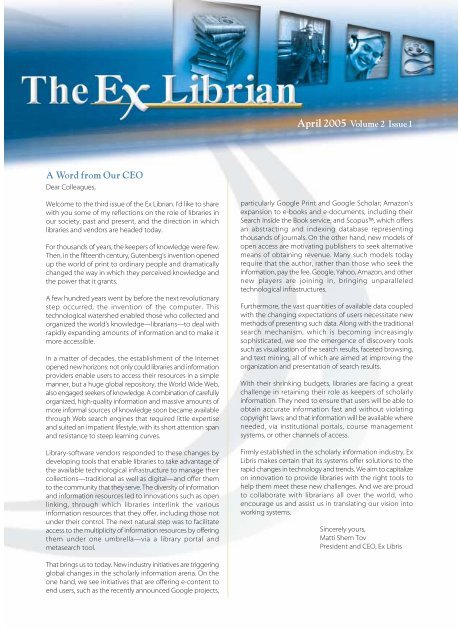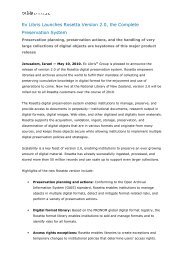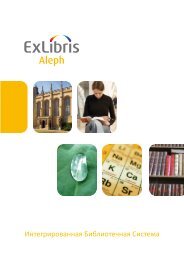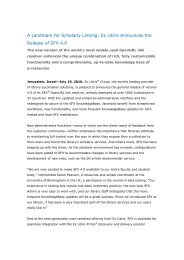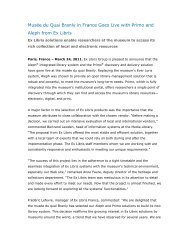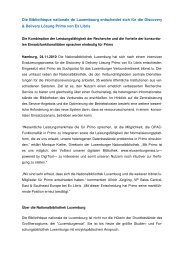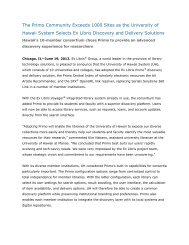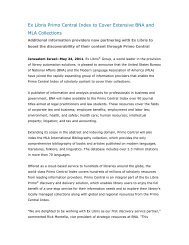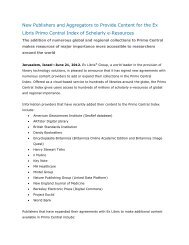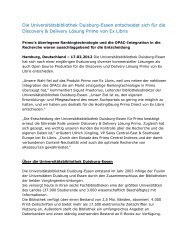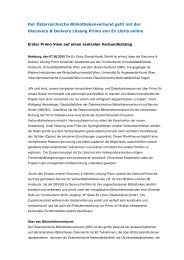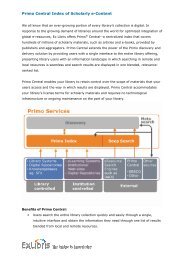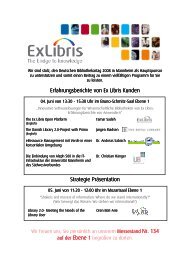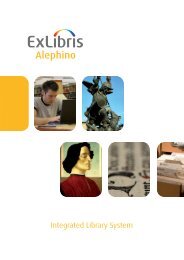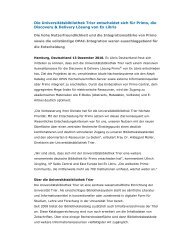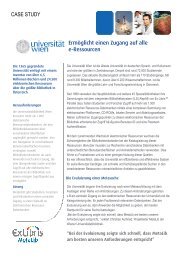April 2005 Issue - Ex Libris
April 2005 Issue - Ex Libris
April 2005 Issue - Ex Libris
Create successful ePaper yourself
Turn your PDF publications into a flip-book with our unique Google optimized e-Paper software.
A Word from Our CEO<br />
Dear Colleagues,<br />
Welcome to the third issue of the <strong>Ex</strong> Librian. I’d like to share<br />
with you some of my reflections on the role of libraries in<br />
our society, past and present, and the direction in which<br />
libraries and vendors are headed today.<br />
For thousands of years, the keepers of knowledge were few.<br />
Then, in the fifteenth century, Gutenberg’s invention opened<br />
up the world of print to ordinary people and dramatically<br />
changed the way in which they perceived knowledge and<br />
the power that it grants.<br />
A few hundred years went by before the next revolutionary<br />
step occurred, the invention of the computer. This<br />
technological watershed enabled those who collected and<br />
organized the world’s knowledge—librarians—to deal with<br />
rapidly expanding amounts of information and to make it<br />
more accessible.<br />
In a matter of decades, the establishment of the Internet<br />
opened new horizons: not only could libraries and information<br />
providers enable users to access their resources in a simple<br />
manner, but a huge global repository, the World Wide Web,<br />
also engaged seekers of knowledge. A combination of carefully<br />
organized, high-quality information and massive amounts of<br />
more informal sources of knowledge soon became available<br />
through Web search engines that required little expertise<br />
and suited an impatient lifestyle, with its short attention span<br />
and resistance to steep learning curves.<br />
Library-software vendors responded to these changes by<br />
developing tools that enable libraries to take advantage of<br />
the available technological infrastructure to manage their<br />
collections—traditional as well as digital—and offer them<br />
to the community that they serve. The diversity of information<br />
and information resources led to innovations such as open<br />
linking, through which libraries interlink the various<br />
information resources that they offer, including those not<br />
under their control. The next natural step was to facilitate<br />
access to the multiplicity of information resources by offering<br />
them under one umbrella—via a library portal and<br />
metasearch tool.<br />
That brings us to today. New industry initiatives are triggering<br />
global changes in the scholarly information arena. On the<br />
one hand, we see initiatives that are offering e-content to<br />
end users, such as the recently announced Google projects,<br />
<strong>April</strong> <strong>2005</strong> Volume 2 <strong>Issue</strong> 1<br />
particularly Google Print and Google Scholar; Amazon’s<br />
expansion to e-books and e-documents, including their<br />
Search Inside the Book service; and Scopus, which offers<br />
an abstracting and indexing database representing<br />
thousands of journals. On the other hand, new models of<br />
open access are motivating publishers to seek alternative<br />
means of obtaining revenue. Many such models today<br />
require that the author, rather than those who seek the<br />
information, pay the fee. Google, Yahoo, Amazon, and other<br />
new players are joining in, bringing unparalleled<br />
technological infrastructures.<br />
Furthermore, the vast quantities of available data coupled<br />
with the changing expectations of users necessitate new<br />
methods of presenting such data. Along with the traditional<br />
search mechanism, which is becoming increasingly<br />
sophisticated, we see the emergence of discovery tools<br />
such as visualization of the search results, faceted browsing,<br />
and text mining, all of which are aimed at improving the<br />
organization and presentation of search results.<br />
With their shrinking budgets, libraries are facing a great<br />
challenge in retaining their role as keepers of scholarly<br />
information. They need to ensure that users will be able to<br />
obtain accurate information fast and without violating<br />
copyright laws; and that information will be available where<br />
needed, via institutional portals, course management<br />
systems, or other channels of access.<br />
Firmly established in the scholarly information industry, <strong>Ex</strong><br />
<strong>Libris</strong> makes certain that its systems offer solutions to the<br />
rapid changes in technology and trends. We aim to capitalize<br />
on innovation to provide libraries with the right tools to<br />
help them meet these new challenges. And we are proud<br />
to collaborate with librarians all over the world, who<br />
encourage us and assist us in translating our vision into<br />
working systems.<br />
Sincerely yours,<br />
Matti Shem Tov<br />
President and CEO, <strong>Ex</strong> <strong>Libris</strong>
Table of Contents<br />
Verde News<br />
DigiTool<br />
DigiTool in Action<br />
DigiTool Version 3 — Coming Soon<br />
ALEPH<br />
New ALEPH 500 Customers<br />
ADAM<br />
First ARC Customers<br />
Q&A<br />
The <strong>Ex</strong> <strong>Libris</strong> Support Center<br />
News from Around the World<br />
Update from <strong>Ex</strong> <strong>Libris</strong> China<br />
SUNCAT Launch<br />
Update From <strong>Ex</strong> <strong>Libris</strong> Germany<br />
<strong>Ex</strong> <strong>Libris</strong> in National Libraries<br />
Who’s Who and Who’s New at <strong>Ex</strong> <strong>Libris</strong><br />
Events<br />
<strong>Ex</strong> <strong>Libris</strong> Webinars<br />
ICAU in London<br />
List of Events<br />
Editor’s Note<br />
2<br />
3<br />
3<br />
4<br />
5<br />
5<br />
6<br />
7<br />
7<br />
8<br />
9<br />
9<br />
10<br />
10<br />
11<br />
13<br />
13<br />
13<br />
14<br />
15<br />
Dear Colleagues,<br />
I am pleased to present you with the first <strong>2005</strong> edition of the<br />
<strong>Ex</strong> Librian. You will notice that whereas the <strong>Ex</strong> <strong>Libris</strong> products<br />
remain a central newsletter feature, this edition showcases many<br />
of the special achievements of our offices worldwide for 2004<br />
and the first quarter of <strong>2005</strong>. In addition to new members of the<br />
<strong>Ex</strong> <strong>Libris</strong> family, important projects that have moved into<br />
production, and product developments, we have highlighted<br />
two new <strong>Ex</strong> <strong>Libris</strong> initiatives aimed at further improving<br />
communication with our customers.<br />
The first is the inauguration of the <strong>Ex</strong> <strong>Libris</strong> Support Center aimed<br />
at assuring that our customers receive the highest level of<br />
satisfaction at every stage of interaction with the company and<br />
its products. The second is our Webinar program, in which we<br />
invite our customers to receive product updates and<br />
informational briefings via online seminars.<br />
As always, please feel free to contact me with comments or<br />
suggestions you have for the next edition of the <strong>Ex</strong> Librian.<br />
Pleasant reading,<br />
Laura Gilinski<br />
MarCom Manager<br />
laura.gilinski@exlibrisgroup.com<br />
Verde News<br />
- 2 -<br />
In an article entitled “Electronic Resource<br />
Management Systems: The Need and<br />
the Realization”, due to be published in New Library World,<br />
Mark Ellingsen (University of Bristol) and Tamar Sadeh<br />
(<strong>Ex</strong> <strong>Libris</strong>), have noted that the jobs of librarians who deal<br />
with electronic resources are extremely challenging. Among<br />
the reasons they list are the following:<br />
Growth in electronic collections<br />
The increasingly central role these collections play<br />
Large budgets<br />
Endless variation in packages offered by a multitude of<br />
players in the e-resource market<br />
Frequent changes in business models<br />
Lack of automated tools to deal with this complex<br />
environment<br />
It is no wonder, therefore, that a meeting of the American<br />
Library Association (ALA) ALCTS Electronic Resource Interest<br />
Group, at which Ivy Anderson (Harvard University) and Ellen<br />
Finnie Duranceau (MIT) discussed their work with <strong>Ex</strong> <strong>Libris</strong><br />
in the co-development of Verde, drew on 15 January <strong>2005</strong><br />
a “standing room only” crowd of more than 400 people.<br />
The impetus for the development of Verde came from a<br />
concept paper delivered by Mark Ellingsen, Owen Stephens,<br />
and Nadine Hill from AUG-UKI (ALEPH User Group, UK and<br />
Ireland) that was presented at a meeting sponsored by ICAU<br />
(International Consortium of ALEPH Users) at its annual<br />
meeting in 2002.<br />
Following upon this work, co-development began with an<br />
initial exploratory meeting in December 2002 and continued<br />
with a series of review meetings in 2003/2004. Including<br />
other ICAU and NAAUG (North American ALEPH User Group)<br />
partners, these meetings have recently advanced to the<br />
point where Harvard and MIT have access to a development<br />
system populated with local data from Harvard and MIT.<br />
According to Ms. Anderson, “We’ve been impressed with <strong>Ex</strong><br />
<strong>Libris</strong>’ grasp of the complexities of e-resource management<br />
and their understanding of the e-resource life-cycle workflow.<br />
The attention that has been paid in the system design to<br />
functional integration…while supporting the unique<br />
requirements of e-resources, is encouraging.”<br />
In their presentation, Ms. Anderson and Ms. Duranceau<br />
observed that the key features of this co-development<br />
process were characterized by being:<br />
Interactive, with extensive impact on design and<br />
development<br />
Focused, with close attention to a data model informed
y “complex scenarios”<br />
Strong relationship to the Digital Library Federation (DLF)<br />
Electronic Resource Management Initiative (ERMI) guidelines<br />
(see http://www.diglib.org/standards/dlf-erm02.htm)<br />
During this entire iterative process <strong>Ex</strong> <strong>Libris</strong> benefited<br />
enormously from Ms. Anderson’s membership on the DLF<br />
ERMI committee and from Ms. Duranceau’s participation on<br />
the DLF librarian reactor panel. <strong>Ex</strong> <strong>Libris</strong> in its turn participated<br />
in the vendor reactor panel. The latter involved cases where<br />
co-development efforts led to direct feedback to the DLF<br />
ERMI guidelines.<br />
As Jenny Walker, Vice President for Marketing at <strong>Ex</strong> <strong>Libris</strong> has<br />
commented, one of the key features of Verde is its global<br />
knowledgebase. SFX customers can make use of their SFX<br />
data for a fast-track implementation of Verde—in fact, they<br />
are so far ahead of the implementation curve that SFX may<br />
put them at the half-way point toward going live with Verde.<br />
“I agree that we have been impressed with <strong>Ex</strong> <strong>Libris</strong>’<br />
commitment to listen to its co-development partners and<br />
incorporate what they hear,” added Ms. Duranceau, “leading<br />
to a real understanding of the challenges of managing eresources.<br />
It has been rewarding to see that understanding<br />
brought to bear in designing Verde.”<br />
Among the goals that MIT hopes to realize from Verde is an<br />
integrated workflow that will minimize the present necessity<br />
of duplicate data maintenance between their integrated<br />
library system (ALEPH) and Vera, MIT’s homegrown ERM<br />
system; simplified access for users; and the elimination of<br />
ongoing development for Vera.<br />
While developed primarily as a staff tool, Verde will<br />
communicate with an institution’s OPAC, library portal, link<br />
server, A-Z list, and other third-party applications via the<br />
Verde web services (SOAP) layer.<br />
<strong>Ex</strong> <strong>Libris</strong>’ new electronic resource management system will debut in<br />
Q2, <strong>2005</strong>.<br />
Stanford<br />
University, the<br />
first <strong>Ex</strong> <strong>Libris</strong><br />
site to go live<br />
with SFX®<br />
version 3,<br />
celebrates the<br />
event with<br />
freshly baked<br />
SFX cookies<br />
- 3 -<br />
DigiTool in Action-the UK<br />
DigiTool Programme<br />
Following ICAU in Vienna in 2003, <strong>Ex</strong> <strong>Libris</strong> (UK) Ltd., in<br />
partnership with the AUG-UKI (ALEPH User Group, UK and<br />
Ireland) Strategy Group [of Chief Librarians], launched the UK<br />
DigiTool Programme “to examine the use and role of DigiTool<br />
in handling a variety of corporate and library collections”. The<br />
Programme Director, Dr. Paul Ayris (Director of Library Services,<br />
UCL) provided an update on the programme at ICAU in Porto<br />
in September 2004, an extract of which is below.<br />
The UK DigiTool Programme comprises 3 projects:<br />
Managing Committee records (lead site — The University<br />
of Westminster)<br />
Managing E-Theses (lead site — UCL)<br />
Managing small image collections (lead site — Royal<br />
Holloway, University of London; partner site Goldsmiths<br />
College, University of London)<br />
While each of the projects shares similar themes, their scopes<br />
vary slightly. For example, the scope of UCL’s E-Theses project<br />
includes the investigation of:<br />
considerations of authentication, authorisation, and security<br />
deposit, including support for mediated deposit, and the<br />
ease and feasibility of self-deposit by authors<br />
interactions between DigiTool and the Information<br />
Landscape in UCL<br />
OAI-compliance, support for standard metadata schema,<br />
and ease of configuration<br />
role of digital object management in the library’s E-Strategy<br />
search and retrieval, including indexing quality and ease<br />
and speed of retrieval<br />
storage and preservation issues<br />
support for multimedia content<br />
training implications, both for library staff and for end-users<br />
Summer <strong>2005</strong> will see the ‘Evaluation’ strand of the UK<br />
DigiTool Programme, with the results being presented at<br />
ICAU in Sweden in 2006, and summarised in the October<br />
2006 issue of The <strong>Ex</strong> Librian.
Thumbnail digital images (with associated metadata) in DigiTool Resource Discovery<br />
The Evaluation strand (lead site — the University of East<br />
Anglia) will evaluate the potential of DigiTool to meet a<br />
range of teaching and learning, research, and corporate<br />
needs; all of which are relevant to academics for different<br />
aspects of their work.<br />
DigiTool Version 3 – Coming Soon<br />
<strong>Ex</strong> <strong>Libris</strong> is pleased to announce that version 3 of DigiTool,<br />
a breakthrough concept in the management of digital assets<br />
for the academic community, will be ready for release during<br />
Q3 <strong>2005</strong>. Although we will have to leave you in suspense<br />
with the full product description until the next edition of<br />
the <strong>Ex</strong> Librian…we will tell you that DigiTool version 3 is<br />
designed to address the vital issues of digital object<br />
preservation as well as enhanced collection creation,<br />
management, and sharing. This product version will enable<br />
institutions to create, manage, and preserve locally<br />
administered digital collections while providing local patrons<br />
and other institutions with easy, comprehensive access to<br />
them. Built to take a comprehensive e-campus view into<br />
consideration, DigiTool version 3 provides institutions with<br />
the means to easily integrate digital collections into<br />
- 4 -<br />
institutional portals, products, and services, including patron<br />
directories and e-learning systems—providing patrons with<br />
a seamless working environment.<br />
Based on a unique set of modules that work together to<br />
provide complete solutions for the needs of a wide range<br />
of digital collection types, the modular, flexible, and open<br />
DigiTool architecture is targeted at addressing current and<br />
future requirements of:<br />
Institutional repositories—management and dissemination<br />
of digital materials created by the institution and its<br />
community members—such as theses, dissertations, and<br />
the like.<br />
Educational material collections including learning<br />
objects, e-reserves, and licensed collections—targeted at<br />
enhancing the learning experience and scholarly research<br />
efforts.<br />
Special collections held and preserved by institutions for<br />
the benefit of society including digitized cultural heritage<br />
collections.<br />
For additional information on DigiTool, please see<br />
www.exlibrisgroup.com/digitool.htm.
New ALEPH 500 Customers<br />
Join us on a trip around the world to meet new<br />
ALEPH 500 TM<br />
customers!<br />
We start our journey in Tennessee, USA, land of country<br />
music and the Southern Adventist University, which has<br />
chosen the entire <strong>Ex</strong> <strong>Libris</strong> product suite– ALEPH 500,<br />
MetaLib/SFX, DigiTool, Verde. The Southern Adventist<br />
University library houses a very special collection of material<br />
on Abraham Lincoln and the Civil War<br />
We then pick up the famous “Chatanooga Choo Choo” due<br />
east to the Union Theological Seminary & Presbyterian School<br />
of Christian Education in Richmond, Virginia that has selected<br />
ALEPH 500 and MetaLib/SFX. The primary mission of the<br />
Library is to support instruction at the three institutions that<br />
comprise the Richmond Theological Consortium — the Baptist<br />
Theological Seminary, the Samuel L. DeWitt School of Theology<br />
at Virginia Union University, and the Union Theological<br />
Seminary & Presbyterian School of Christian Education.<br />
From Virginia we journey to the Connecticut River Valley in<br />
western Massachusetts, where Five Colleges, a consortium of<br />
the highest academic level, has opted for ALEPH 500, and the<br />
Verde electronic resource management system. Don’t miss the<br />
free shuttle bus between the consortium members: Amherst<br />
College, Hampshire College, Mount Holyoke College, Smith<br />
College, and the University of Massachusetts Amherst. The<br />
consortium boasts an interlibrary loan program, allowing students<br />
and faculty to take advantage of all five campus collections.<br />
Wave the Maple Leaf – we’re going north! The Canadian<br />
ALEPH 500 family was honored to be joined by the Novanet<br />
Consortium on December 31 st<br />
2004. Novanet is comprised<br />
of the libraries of the Atlantic School of Theology, Dalhousie<br />
- 5 -<br />
University, Mount Saint Vincent University, Nova Scotia<br />
Agricultural College, NSCAD University, Nova Scotia<br />
Community College, Saint Mary’s University, St. Francis Xavier<br />
University, University College of Cape Breton, and University<br />
of King’s College. The total number of <strong>Ex</strong> <strong>Libris</strong> sites in Canada<br />
now reaches 39.<br />
Hold on to your hat, we are about to cross the Atlantic and<br />
visit the European Commission, another new ALEPH 500 site.<br />
The Central Library of the European Commission is a special<br />
reference and research library, established to meet the library<br />
needs of the European Commission and its staff. The<br />
agreement signed by <strong>Ex</strong> <strong>Libris</strong> and the European Commission<br />
entails use and maintenance of the ALEPH 500 system for all<br />
members of the RéseauBib, the network of libraries of the<br />
European Commission's Directorates General and departments.<br />
From Belgium, our tour takes us to one of the Switzerland’s<br />
most northerly cantons, Aargau, where the Library Network of<br />
Swiss Canton Aargau has selected ALEPH 500 to replace its<br />
SISIS system. Aargau is the fourth Swiss canton to opt for ALEPH.<br />
We bid adieu to Europe and travel eastward to Egypt! The<br />
Institut Français d'Archéologie Orientale in Cairo,<br />
established in 1880, is well known by researchers around<br />
the world for its incomparable treasures in the fields of<br />
Egyptology, papyrology, and the study of the Byzantine,<br />
Coptic, and Arab cultures. Researching the ancient treasures<br />
will now be facilitated by ALEPH 500.<br />
Leaving the land of pharaohs and pyramids, our <strong>Ex</strong> <strong>Libris</strong><br />
globetrotting tour arrives in China! Guangdong, in the southern<br />
part of the South China Sea, is home to Guangdong University<br />
of Foreign Studies, China’s most prestigious school for<br />
international studies, and the latest ALEPH 500 site in China.<br />
Bon Voyage!
ADAM (ALEPH Digital Asset Management)<br />
— NowAvailable<br />
The release of ALEPH 500 version 17.01 brings with it a wealth<br />
of new features including the optional ADAM module that<br />
enables libraries to manage digital assets—audio, video,<br />
image, and sound—and their associated metadata within<br />
the ALEPH 500 environment. Libraries are now able to load<br />
their full range of digital objects, create associated<br />
bibliographic data in the MARC format of their choice, and<br />
add technical metadata using the familiar ALEPH 500<br />
Cataloging Module.<br />
Patrons using the ADAM module can browse metadata,<br />
perform full-text searches, retrieve, and view digital objects<br />
in the library OPAC. Object Management settings define if<br />
an object can be viewed freely, requires copyright agreement,<br />
or is restricted to a defined group of users or IP address.<br />
Cataloging digital objects in ALEPH 500<br />
The ALEPH 500 cataloging module includes an interface for<br />
uploading digital objects and creating and updating<br />
Full record view in ALEPH 500 OPAC<br />
Digital rights management<br />
- 6 -<br />
associated metadata. As the cataloging method in ADAM<br />
is similar to that used in ALEPH 500, staff will master this<br />
quickly and easily. Importing metadata and/or objects and<br />
linking them to new or existing bibliographic records in the<br />
system can be handled manually or in batch mode.<br />
Simultaneous display of digital objects and bibliographic<br />
records allows catalogers to refer to the object while creating<br />
and/or updating the bibliographic record.<br />
Staff can define object access rights as part of the definition<br />
process—for example, only patrons who have signed-in or<br />
have addressed the system via a particular IP address may<br />
view a specific object. Copyright notices may be attributed<br />
to select objects where appropriate. Authorized patrons<br />
wishing to view a copyright-protected object will be obliged<br />
to accept these conditions prior to accessing it. Libraries or<br />
departments within the library that do not wish to share their<br />
objects can set up unique directories to ensure that objects<br />
in their possession remain discreet.<br />
Full record view in Search<br />
Upon obtaining search results and before presenting them to the patron in the brief view page, ADAM verifies user permissions<br />
and digital object restrictions. If user permissions—determined by user sign-in—do not correspond with digital object restrictions,<br />
the user will be unable to view the object. Access to digital objects can be limited based on user status, IP address, course<br />
enrollment, sub-library, and expiration date. The system enables limiting access to a certain number of concurrent users.<br />
Copyright statements may be presented to users prior to viewing any protected object. The library can maintain different<br />
types of copyright notices and specify which will be displayed before allowing patrons to access the object. Although ADAM<br />
is not a tool for digital object license management, it does support the recording of licensing information for objects acquired<br />
and/or purchased from external bodies.
<strong>Ex</strong> <strong>Libris</strong> Reports First ALEPH<br />
Reporting Center Customers<br />
The University of New South Wales, located in Sydney,<br />
Australia, serves over 40,000 students from over 120<br />
countries. The UNSW Library is associated with many<br />
Australia-wide research and development projects.<br />
Université Paris 3 Sorbonne Nouvelle is part of the<br />
venerable Sorbonne University in Paris. Both the Library<br />
catalog and the Interuniversity Library for Oriental<br />
Languages run ALEPH.<br />
Temasek Polytechnic in Singapore is a pioneer in library<br />
portal development. The Temasek Library uses ALEPH,<br />
MetaLib and SFX.<br />
University College London has the highest number of<br />
professors of any university in the UK, and boasts 18 Nobel<br />
Prize winners among its staff and graduates.<br />
The Library of the Southern Baptist Technological<br />
Seminary in Louisville, Kentucky, USA was established in<br />
1859, with 2000 items. The Seminary collection now<br />
numbers close to one million items.<br />
The Library of the University of Tennessee Knoxville,<br />
USA, an ARL member, added ARC to its current suite of <strong>Ex</strong><br />
<strong>Libris</strong> products—ALEPH 500, MetaLib, SFX, and DigiTool.<br />
Another ARL member, McGill University of Montreal,<br />
Canada, has been an <strong>Ex</strong> <strong>Libris</strong> site since 1999. The McGill<br />
University Library System is comprised of 18 individual<br />
sites and collections.<br />
An <strong>Ex</strong> <strong>Libris</strong> corporate client, MOL Hungarian Oil and<br />
Gas Plc is part of the multinational MOL petroleum<br />
company.<br />
Q&A<br />
This new section of the newsletter is designed<br />
to provide our readers with a place to ask<br />
specific questions regarding the <strong>Ex</strong> <strong>Libris</strong><br />
products and their functionality. We welcome your questions<br />
which may be addressed to Laura Gilinski at<br />
laura.gilinski@exlibrisgroup.com. Please note, that while we<br />
will address a number of the questions received we may<br />
not be able to address all of them in the next edition.<br />
During the last few months we have received a number of<br />
queries regarding the new PDS service that has been<br />
mentioned in much of our literature. In order to clarify this<br />
matter we have addressed it here:<br />
- 7 -<br />
What is PDS?<br />
The <strong>Ex</strong> <strong>Libris</strong> Patron Directory Service (PDS) is a back-end Web<br />
component that facilitates shared user authentication and<br />
single sign-on (SSO) capabilities among the applications in the<br />
<strong>Ex</strong> <strong>Libris</strong> suite of products. The PDS can be configured to<br />
authenticate users in reference to a database managed by the<br />
specific <strong>Ex</strong> <strong>Libris</strong> application in use, or to integrate with an<br />
existing—typically institutional—authentication system. The<br />
PDS supports integration with LDAP and Active Directory servers,<br />
and with Aleph patron directories; other authentication systems<br />
are supported via a generic ‘hook’ or interface. The PDS can<br />
also be configured to redirect authentication to a remote<br />
authentication server, bypassing the login screen of the <strong>Ex</strong> <strong>Libris</strong><br />
application.<br />
The PDS supports a two-part process for user authentication<br />
and authorization. First, the user’s credentials – for example, the<br />
user name and password – are checked to verify the user’s<br />
identity (authentication). Second, user attributes can be retrieved<br />
– for example, user group – for use in the authorization process,<br />
which is managed by the specific <strong>Ex</strong> <strong>Libris</strong> application. The PDS<br />
accommodates verification of user credentials against one<br />
system, and retrieval of user attributes from another system.<br />
The service can be configured to work in a consortia<br />
environment in which several institutions share the same<br />
applications but each has its own authentication system.<br />
The following products include the <strong>Ex</strong> <strong>Libris</strong> PDS component:<br />
ALEPH 500 version 17.01 and later<br />
MetaLib version 3.1 and later<br />
DigiTool version 2.4 and later<br />
PDS and Single Sign-On<br />
for <strong>Ex</strong> <strong>Libris</strong> products<br />
The PDS component checks whether a patron who is<br />
attempting to access a given system has already been<br />
authenticated for access to another product in the suite. If<br />
so, the PDS logs in the patron without requesting a user<br />
name and password. Similarly, a patron who is logging off<br />
one application can be automatically logged off the PDS<br />
and all the applications that are working with it (single signoff).<br />
The PDS component can be configured to prompt users<br />
who are logging off one system to select the other<br />
applications from which they also want to log off.
The <strong>Ex</strong> <strong>Libris</strong> Support Center<br />
<strong>Ex</strong> <strong>Libris</strong> believes that quality service is increasingly the<br />
feature that distinguishes library automation vendors. In<br />
order to assure that our customers receive the highest level<br />
of satisfaction at every stage of interaction with the company<br />
and its products, we invest a wealth of resources—human<br />
and technological—in enhancing our support infrastructure.<br />
Of the 240 professionals employed by <strong>Ex</strong> <strong>Libris</strong> around the<br />
world, over one-fourth are dedicated to supporting our<br />
customers in operating, upgrading, and troubleshooting<br />
their products.<br />
The new <strong>Ex</strong> <strong>Libris</strong> Customer Support Center, inaugurated<br />
in January <strong>2005</strong>, is a clear illustration of this commitment to<br />
support issues. An advanced Web application, the new<br />
Support Center provides customers with round-the-clock<br />
access to various <strong>Ex</strong> <strong>Libris</strong> support services.<br />
The interactive Support Center is the portal through which<br />
customers track and manage support incidents. Using an<br />
intuitive user interface, customers can open new support<br />
incidents, quickly browse open incidents, perform searches,<br />
add notes to open incidents, close incidents, search the<br />
Knowledgebase, and update profile details with ease.<br />
The Customer Support Center Knowledgebase consists of<br />
a wealth of data gathered from customer Support Incidents.<br />
The Knowledgebase, which increases in size daily, includes<br />
solutions to common problems and questions as well as<br />
product tips and tricks from <strong>Ex</strong> <strong>Libris</strong>.<br />
The Documentation Center, located in the Customer Support<br />
Center, houses a comprehensive collection of technical,<br />
implementation, and support documents for each of the<br />
company’s products. These can be searched by standard<br />
trees or via a special full-text search mechanism. The<br />
Download Center section of the Documentation Center is<br />
where our customers turn to download items such as Service<br />
Packs for software corrections.<br />
Geographical distribution<br />
In order to ensure high-level service and support for all of<br />
our customers across six continents, we have established<br />
regional Customer Support Centers. These facilities are<br />
located close to <strong>Ex</strong> <strong>Libris</strong> customer bases around the world:<br />
in Australia, Brazil, China, France, Germany, Israel, Poland, the<br />
United Kingdom, and the United States. Each regional center<br />
provides technical support to customers in its geographic<br />
region, enabling analysts to respond to service calls quickly<br />
and effectively, regardless of location.<br />
Additional local support offices are available via <strong>Ex</strong> <strong>Libris</strong><br />
partners around the world: in the Czech<br />
Republic, Denmark, Hungary, Italy, Mexico, Norway, Portugal,<br />
South Africa, Spain, and Taiwan.<br />
- 8 -<br />
All regional Customer Support Centers and local offices are<br />
staffed by highly trained, experienced technical<br />
professionals dedicated to providing customers with<br />
excellent service in the customer’s language of choice and<br />
in the appropriate time zone.<br />
Both regional and local Customer Support Centers provide<br />
project management services coordinated with project<br />
managers from <strong>Ex</strong> <strong>Libris</strong> international headquarters. This<br />
ensures quick and efficient planning and support.<br />
Our Customer Support Service Center philosophy is based on<br />
geographical proximity to the customer, speaking the customer's<br />
language, and providing the highest level of support possible.
News From<br />
Around the World<br />
<strong>Ex</strong> <strong>Libris</strong> China - A year in retrospect<br />
2004 was an exciting year for <strong>Ex</strong> <strong>Libris</strong> China. Headed<br />
up by the energetic Fucheng Shen, our Chinese<br />
representatives had very little time to rest in-between<br />
important events and obligations.The year got off to a great<br />
start as the National Library of China chose the SFX contentsensitive<br />
link server and MetaLib® library portal to manage<br />
its large collection of hybrid electronic resources and provide<br />
seamless patron services. A member of the <strong>Ex</strong> <strong>Libris</strong> family<br />
since 2001, the National Library of China is one of the most<br />
important ALEPH 500 customers in China.<br />
Professor Chen Li, Deputy Director of the National Library of<br />
China, commented that the library had compared and<br />
evaluated a large number of domestic and international<br />
systems and had opted for MetaLib/SFX® based on their<br />
successful cooperation with <strong>Ex</strong> <strong>Libris</strong> on the ALEPH 500 project.<br />
The National Library of China signs an agreement for the purchase of<br />
MetaLib and SFX<br />
At the end of 2003 the Beijing Jiaotong University library<br />
selected three <strong>Ex</strong> <strong>Libris</strong> products— ALEPH 500, MetaLib, and<br />
SFX—the first MetaLib/SFX installation in China. To celebrate<br />
the successful move to production of these three systems,<br />
the International Symposium on Knowledge Management<br />
and Digital Service was held at the Beijing Jiaotong University.<br />
The symposium served as a forum for local and foreign<br />
libraries to exchange practical experience on digital services<br />
and explore patterns for knowledge management—adapted<br />
to the development of the digital era. Approximately 50<br />
participants, from over 20 universities, attended this seminar.<br />
Mr. Matti Shem Tov, President and CEO of <strong>Ex</strong> <strong>Libris</strong>, Prof.<br />
Xuewei Li, Vice President of Beijing Jiaotong University, and<br />
Ms. Xiaoming Li, an official from the Ministry of Education,<br />
gave warm speeches at the symposium.<br />
For more information on the International Symposium on<br />
Knowledge Management and Digital Services, see:<br />
http://www.bj.xinhuanet.com/bjpd-zhuanti/bjjtdx.htm.<br />
- 9 -<br />
Attendees of the International Symposium on Knowledge Management<br />
and Digital Service held at the Beijing Jiaotong University<br />
The Annual Meeting of the China Consortia ALEPH User<br />
Group (CCAU) was held in November, 2004 at the Beijing<br />
Normal University Zhuhai Campus. Forty ALEPH 500 users<br />
from all over China were welcomed by Ms. Fu Ailan, Vice<br />
President of the Beijing Normal University Zhuhai Campus.<br />
This annual meeting focused on customization and<br />
localization of the ALEPH 500 system.<br />
A session at the annual meeting of the China Consortia ALEPH User<br />
Group (CCAU)<br />
The Rise of SUNCAT<br />
(the Serials Union Catalogue):<br />
Unlocking Access to Serials in the UK<br />
The contents of journals and other serials represent<br />
an immense and invaluable resource for researchers<br />
in all subjects. However, the task of identifying,<br />
locating, and accessing these serials, held by institutions<br />
across the UK, has presented a significant challenge. SUNCAT<br />
— an implementation of ALEPH 500 — has been built to<br />
help meet that challenge.<br />
Funded by JISC (The Joint Information Systems Committee)<br />
and the RSLP (Research Support Libraries Programme) since
2003, and developed by EDINA at the University of Edinburgh<br />
in partnership with <strong>Ex</strong> <strong>Libris</strong>, SUNCAT has achieved a critical<br />
mass of just over four million records. These are made up of<br />
records from national libraries, the largest UK academic<br />
library collections, and international databases. Phase 2 of<br />
the programme, which will see coverage of the catalogue<br />
extend to up to 60 new libraries across the UK, has also been<br />
funded by JISC and is now underway.<br />
SUNCAT will also be developed to integrate fully with other<br />
services on serials within the JISC information environment,<br />
supporting work in the areas of electronic subscription<br />
information, online access to journals, electronic document<br />
delivery, e-theses, and repositories, amongst others. As such,<br />
SUNCAT will further develop as a key tool for researchers,<br />
librarians, and others within colleges, universities, and beyond.<br />
The official launch of SUNCAT took place on 15th February<br />
<strong>2005</strong> at The Law Society, London. Following the welcome<br />
and introduction by Derek Law (Librarian and Head of<br />
Information Resources Directorate, University of Strathclyde),<br />
Derek and Ronald Milne (Acting Director of University Library<br />
Services and Bodley’s Librarian, University of Oxford) discussed<br />
the origins and vision of SUNCAT and were followed by<br />
Peter Burnhill (Director, EDINA), Hugh Taylor (Head, Collection<br />
Development and Description, Cambridge University Library),<br />
and Andrew Green (Librarian, National Library of Wales) who<br />
discussed their experiences to date. Peter continued by<br />
outlining the processes for phase two of SUNCAT before<br />
the audience toasted the success of SUNCAT at a reception<br />
hosted by Reg Carr (Director of University Library Services<br />
and Bodley’s Librarian, University of Oxford).<br />
To access the pilot SUNCAT service and for further information,<br />
please go to: http://edina.ac.uk/suncat<br />
- 10 -<br />
The Bavarian Central Union Catalog<br />
Project Goes Live<br />
With the entrance of electronic data processing into<br />
libraries in the 1970s, a requirement arose for a<br />
descriptive cataloging system based on the shared<br />
creation and reuse of cataloging records. This led to the<br />
formation of library networks in some of the German states.<br />
In 1983, the German Consortium of Library Networks was<br />
established based on the Deutsche Forschungsgemeinschaft<br />
(DFG) recommendations for the development of regional<br />
networks. The chief tasks of the Consortium were the<br />
coordination and introduction of common, innovative library<br />
services based on general hardware, software, and data<br />
communications standards; coordination and application<br />
of library codes and standards for cooperative cataloging,<br />
indexing, interlibrary loans and data exchange; as well as<br />
the representation of Consortia members’ interests within<br />
official bodies and institutions. By developing these consortia,<br />
German libraries began extending their services to remote<br />
users, expanding resource offerings, and supporting initiatives<br />
such as distance education. Library network centers and Die<br />
Deutsche Bibliothek—the German National Library, and the<br />
Austrian Library Network cooperate within the Consortium<br />
of Library Networks.<br />
A number of consortial models have been developed to<br />
meet the requirements of these different regional units. One<br />
of the most basic requirements is a union catalog developed<br />
to enhance the specific workflow needs of each consortium.<br />
ALEPH Cluster, <strong>Ex</strong> <strong>Libris</strong>’ unique, ever-expanding set of<br />
products designed to meet the complex functionality and<br />
service requirements of multi-site libraries, aids organizations<br />
that form one unit based on geographic proximity,<br />
institutional linkage, subject matter, or any other defined<br />
need; to share bibliographic data, users' data, and end user<br />
services while preserving the degree of autonomy required<br />
by each local member.<br />
The summer of 2004 saw the successful migration of the<br />
State of Bavaria system from an old mainframe Central Union<br />
Catalog to ALEPH 500. This project, which began in February<br />
2003, involved the conversion and migration of 13,000,000<br />
title records and 7,000,000 authority records. In order to<br />
facilitate the move to ALEPH 500, 270 librarians were trained<br />
in a “train the trainer” method so that today there are<br />
approximately 800 ALEPH 500 catalogers in the State of<br />
Bavaria. The ALEPH 500 system runs on a SUN cluster<br />
environment based on 2 SUN V1280 and 2 SUN V880. The<br />
software “agents” required for this system were developed<br />
during the course of the project.<br />
In parallel to the Central Union Catalog activities, the Bavarian<br />
State implemented the MetaLib-based “Gateway Bayern” as<br />
its central search environment. This includes a consortial<br />
SFX solution with instances for each Bavarian University.<br />
During the annual conference of Bavarian Library Directors,
which took place in Munich in December 2004, Mr. Eginhardt<br />
Scholz of the Central Office of the State Library toasted the<br />
final acceptance of the system with Michael Luetgen,<br />
Managing Director of <strong>Ex</strong> <strong>Libris</strong> Germany.<br />
The employees of <strong>Ex</strong> <strong>Libris</strong> (Germany) extend a warm thanks<br />
to all of their Bavarian colleagues that cooperated on this<br />
project.<br />
The European Commission Selects ALEPH 500<br />
Another major milestone for <strong>Ex</strong> <strong>Libris</strong> Germany was the<br />
decision of the EU Commission Central Library in Brussels<br />
to choose ALEPH 500 as its future integrated library system.<br />
The most challenging aspect of this project is that the system<br />
will be required to support at least 12 European languages<br />
simultaneously. Following the signing of the initial framework<br />
agreement in December 2004, additional EU libraries began<br />
joining the ALEPH 500 family. The first library to follow, in<br />
January <strong>2005</strong>, was the library of the European Court of<br />
Auditors in Luxembourg—that chose the Alephino system.<br />
The Court Library is <strong>Ex</strong> <strong>Libris</strong>’ 100th Alephino customer.<br />
We welcome the EU libraries to the <strong>Ex</strong> <strong>Libris</strong> family and look<br />
forward to a long and fruitful cooperation.<br />
Implementation of the first EU library is planned for <strong>2005</strong>.<br />
Please note that <strong>Ex</strong> <strong>Libris</strong> Germany will move offices in <strong>April</strong><br />
<strong>2005</strong>. Notification will be sent out as to the new contact details.<br />
This information will also become available on our website:<br />
http://www.exlibrisgroup.com/offices.htm#germany.<br />
<strong>Ex</strong> <strong>Libris</strong> in National Libraries<br />
The leading if not the pre-eminent supplier of library<br />
management software to national libraries, <strong>Ex</strong> <strong>Libris</strong> has<br />
supplied products that currently run in 23 national libraries<br />
in Armenia, Austria, Belgium, Chile, China, the Czech Republic,<br />
Denmark, Finland, Iceland, Israel, Japan, Kosovo, Latvia,<br />
Lichtenstein, Luxembourg, Mexico, Netherlands, Russia,<br />
Sweden, Taiwan, Turkey, UK, and the USA.<br />
<strong>Ex</strong> <strong>Libris</strong> has engaged in a great deal of research, regarding the<br />
unique requirements of national libraries in order to develop<br />
high-performance products robust enough to meet the needs<br />
of these institutions. National libraries are a category unto<br />
themselves, a few of whose distinctive characteristics include:<br />
National library as national repository<br />
National libraries are generally a county’s designated national<br />
repository, collecting literature published in the country, in the<br />
language of the country, or about the country they represent.<br />
At the end of the 16th century, the Prague censorship office<br />
- 11 -<br />
was the first to organize controlled delivery of publications.<br />
Since this time, print publishers in most countries have been<br />
obligated to provide their national library with a specified<br />
number of all publications —to be held for national use. With<br />
the increased prevalence of electronic publications, new<br />
legislation often requires national libraries to receive a copy of<br />
digital as well as print publications, making national libraries<br />
the owners of huge collections—requiring the most<br />
sophisticated of integrated library systems, such as ALEPH 500.<br />
Cataloging in a national library requires efficient access to and<br />
flexible manipulation of data to process a large quantity of<br />
deposits quickly. Staff require the ability to add bibliographic<br />
records, holdings data, and items, and to change information<br />
about an item, including its location and barcode, and move<br />
or transfer items efficiently from one holdings or bibliographic<br />
record to another. They must do all of this while preserving<br />
ownership information, call numbers, and circulation history<br />
as well as safeguarding data integrity, including granular<br />
permissions and data validation routines.<br />
A number of <strong>Ex</strong> <strong>Libris</strong> customers have opted for DigiTool to<br />
manage their legal depositories. The National Library of<br />
Belgium, for example, was motivated to obtain DigiTool<br />
following the extension of the Belgian law, dating from 1965,<br />
pertaining to the legal deposit of printed documents to<br />
include electronic publications. Features of interest to legal<br />
depositories include the ability to allow publishers easy,<br />
Web-based deposit of publications as well as status-driven<br />
deposit workflow management which allows approvers to<br />
review, revise, and approve deposits.<br />
The sophisticated, flexible DigiTool product has also become<br />
popular with national libraries, interested in preserving<br />
special collections of national heritage treasures with which<br />
they have been endowed. These often digitized collections<br />
include rare manuscripts, ancient maps, newspapers,<br />
magazines, prints and drawings, music scores, and patents.<br />
Sound archives may carry anything from early recordings<br />
to the latest CD, DVD, and minidisc recordings.<br />
Multilingual system requirements<br />
The National Library of China boasts over 22 million volumes<br />
and that of the British Library includes 150 million items<br />
representing most known languages. Clearly national libraries<br />
search out a product, which at its core deals easily and<br />
efficiently with numerous languages.<br />
ALEPH 500 is Unicode-based, providing multilingual,<br />
multiscript support. The system is available in over 20 interface<br />
language options enabling libraries to select the languages<br />
that will best serve their patrons. Staff and patrons can<br />
interact with the system in any of the library-defined<br />
languages and can change their interface language<br />
preference at any time. Once specified, this language is<br />
linked to the patron’s library profile; thereafter, all library<br />
functions are carried out in the patron’s language of choice.
Remote storage facilities<br />
The sheer quantity of materials held by national libraries<br />
requires the storage of some items in off-site, remote storage<br />
facilities. Once transferred to the remote storage facility, the<br />
library is often challenged by the need to supply a specific<br />
item to a patron at a set time. The ALEPH 500 closed stack and<br />
off-site materials storage functionality assists national library<br />
staff in providing patrons with items they require, to the<br />
requested reading room in a timely fashion.<br />
After the patron has placed an items request, the ALEPH 500<br />
materials paging utility identifies the exact location of the item<br />
and—if it is stored in a remote facility—the closest van pickup<br />
time and date. An interface that interacts with depository<br />
management software transfers information about requested<br />
items and provides users with immediate feedback regarding<br />
availability and the time that their requested item will be delivered<br />
to the library, and to their preferred reading room. A systemgenerated<br />
paging slip prompts staff to pull the requested material<br />
and transfer it to the designated pickup location.<br />
National libraries are generally closed-stack institutions, a fact<br />
that may potentially create a problem for patrons who would<br />
like to use an item continuously rather than one time. A special<br />
Reading Room functionality, originally developed by <strong>Ex</strong> <strong>Libris</strong><br />
for the Royal Library of Sweden, alleviates this difficulty. Upon<br />
requesting a specific item, patrons are presented with a pulldown<br />
menu offering a choice of the Reading Rooms in which<br />
the item can be used. Once the request is processed, the<br />
system automatically assigns the items to the patron who has<br />
ordered it and changes its location to that of the selected<br />
reading room. From this point, the item is available to the<br />
patron, in the selected reading room, for a library-designated<br />
period of time. After each use, the patron returns the item to<br />
the librarian responsible for the reading room. The item is<br />
returned to closed stacks after the library-specified period of<br />
time has elapsed.<br />
As national libraries materials are generally not permitted<br />
to be removed from the premises, patrons often request<br />
that a photocopy of all or part of a required document be<br />
provided them. Sophisticated, library-defined Document<br />
Delivery functionalities enable staff to process these requests<br />
easily. Document Delivery requests can be made directly by<br />
patrons from the ALPEH 500 Web OPAC or by staff in the<br />
Windows client. As soon as a patron photocopy request has<br />
been made, a print request or pull slip can be generated<br />
and printed at the appropriate circulation desk. Patrons can<br />
be billed according to the paper size used for the<br />
photocopies after which the copies can be delivered to a<br />
particular location or held for patron pickup. Photocopy<br />
requests can be deleted after the requested document or<br />
portion has been printed.<br />
- 12 -<br />
Portals for National Libraries<br />
National libraries are typically also very much engaged in<br />
providing Web access to the broad subject area of local<br />
language, history and culture. Through the library, access is<br />
provided to a wide range of Web-accessible material including<br />
the catalogues of the library’s own holdings, to databases and<br />
e-journals under license, to electronic full content stored<br />
locally, to digitized image material, to Web expositions, and<br />
to much other informative material. With this diversity it is<br />
necessary to manage a wide range of access controls, search<br />
mechanisms and linking facilities. Such infrastructure should<br />
be of no concern however to the audiences that a national<br />
library attracts over the Web: the general public but also<br />
students and researchers. Each should experience easy search<br />
and access.<br />
The Koninlijke Biblioteek (KB) in the Netherlands, the National<br />
Library of the Czech Republic, and the National Library of<br />
Finland represent some of the national libraries who have<br />
selected MetaLib as their library portal.<br />
For the KB MetaLib and SFX offer a portal product and dynamic<br />
linking solution with which it can begin to realize its goals of<br />
hiding digital library complexities for the very diverse audience<br />
that they serve. MetaLib has been integrated in the KB Web<br />
site by giving it the same look and feel and by using the<br />
MetaLib “deep linking” capabilities to link directly to MetaLib<br />
search results from a search box on the library’s home page.<br />
The KB patrons can easily navigate between the library’s home<br />
page and MetaLib. The MetaLib QuickSearch feature, the<br />
default entry point at the KB, is being used effectively to<br />
provide searching in predefined lists of resources of general<br />
relevance to Dutch language, history and culture. The merged,<br />
ranked and deduplicated search results support a general<br />
audience.<br />
The KB staff believes that modules like MetaSearch, the MetaLib<br />
resource discovery tools, and the personalization features are<br />
more applicable to the specialized needs of students and<br />
researchers. The KB staff will undertake further evaluation to<br />
refine their assumptions and to better assess the effectiveness<br />
of the way MetaLib is customized and integrated into their<br />
local environment.<br />
The library staff at the National Library of the Czech Republic<br />
have written and presented extensively on their deployment<br />
of MetaLib and SFX. For a comprehensive description of the<br />
MetaLib implementation at the Czech National Library which<br />
received the INFORUM 2002 AWARD, given to the most<br />
important Czech and Slovak products, services or acts<br />
related to electronic information resources, see<br />
http://www.inforum.cz/inforum2002/english/ceny.htm<br />
For further details on the Finnish National Portal, see<br />
http://www.lib.helsinki.fi/finelib/english/
Who’s Who and Who’s New<br />
at <strong>Ex</strong> <strong>Libris</strong>?<br />
Jun Hong, Regional Manager, North East Asia,<br />
<strong>Ex</strong> <strong>Libris</strong> Ltd. — Based in downtown Seoul, Korea,<br />
Jun represents <strong>Ex</strong> <strong>Libris</strong> from his office situated in an area<br />
called King’s Place as it is graced with four beautiful palaces.<br />
Jun has extensive experience in library operations and business<br />
practices in Asia. During his most recent tenure as Asia Pacific<br />
Library Services <strong>Ex</strong>ecutive at OCLC, Jun was in charge of<br />
operations in India, Korea, Pakistan, Thailand, and Vietnam.<br />
<strong>Ex</strong> <strong>Libris</strong> Korea:<br />
1322 Yongbiochonga, 75 Naesu-Dong<br />
Jongno-Gu, Seoul, 110-070, Korea<br />
Tel: +82-2-2195-5432<br />
Fax: +82-2-2195-5440<br />
Dr. Peter Ahrens, Senior e-Library & Integration<br />
Consultant (SFX, MetaLib & Verde) <strong>Ex</strong> <strong>Libris</strong><br />
(Deutschland) GmbH — Peter has 15 years of experience<br />
in business development and sales management in the<br />
electronic publishing field. Prior to joining <strong>Ex</strong> <strong>Libris</strong> he held<br />
positions at Elsevier Science and Ovid. Peter holds degrees<br />
in Medicine and Informatics.<br />
René Thomas, Sales Representative (DigiTool), <strong>Ex</strong> <strong>Libris</strong><br />
(Deutschland) GmbH — Based in Hamburg, René is<br />
responsible for the sales of DigiTool-Projects in the German<br />
Events<br />
<strong>Ex</strong> <strong>Libris</strong> Delivers Product and<br />
Informational Updates via Webinars<br />
In the Fall of 2004 <strong>Ex</strong> <strong>Libris</strong> began to test the concept of<br />
delivering product updates and informational briefings via<br />
online seminars (Webinars).<br />
The first of these, in October 2004, “How to <strong>Ex</strong>pose your Digital<br />
Assets to the Light of Day Yet Preserve them From Fading?”<br />
was dedicated to DigiTool and featured both customers<br />
(Robert McDonald [Florida State University] and Este Paskausky<br />
[Boston College]) and <strong>Ex</strong> <strong>Libris</strong> staff (Michael Kaplan). <strong>Ex</strong> <strong>Libris</strong><br />
received over 250 registrations of which over 150 actually<br />
logged in for the session. (Some login sessions were broadcast<br />
to rooms with more than 20 attendees.) Attendees came<br />
from Algeria, Canada, China, Jamaica, Kosova, Macao,<br />
Macedonia, South Africa, and the USA.<br />
In December 2004 Barbara Rad-El delivered a Webinar<br />
entitled “ALEPH Reporting Center (ARC): Bringing the Power<br />
of Web-based Reporting to your Desktop” that attracted<br />
over 200 participants.<br />
- 13 -<br />
office. René has over eight years of experience in sales and<br />
sales management complex-output management solutions<br />
with Xerox Corp.<br />
In January <strong>2005</strong> the <strong>Ex</strong> <strong>Libris</strong> Group announced some<br />
strategic changes to its senior management team--designed<br />
to leverage the entrepreneurial spirit and vision that have<br />
characterized the Information Services Division (ISD) team<br />
for the benefit of all <strong>Ex</strong> <strong>Libris</strong> products.<br />
Oren Beit-Arie, Chief Strategy Officer, <strong>Ex</strong> <strong>Libris</strong> Ltd. —<br />
Oren, who led ISD since February 2000, has now<br />
assumed a new role as Chief Strategy Officer. As such, he<br />
will focus on the strategic development of all <strong>Ex</strong> <strong>Libris</strong><br />
products while exploring new product initiatives to meet<br />
market needs.<br />
Jenny Walker, VP Marketing, <strong>Ex</strong> <strong>Libris</strong> Ltd. — Previously VP<br />
Marketing and Business Development of ISD, Jenny extends<br />
her marketing responsibilities from ISD products to all <strong>Ex</strong><br />
<strong>Libris</strong> products, and will be responsible for all corporate<br />
marketing activities, including product management.<br />
Susan Stearns, VP Customer Services, <strong>Ex</strong> <strong>Libris</strong> (USA) Inc. —<br />
Susan, previously Director of Operations for ISD, has been<br />
promoted to VP Customer Services. In this role, she will<br />
manage the North American implementation, training, and<br />
support teams for all <strong>Ex</strong> <strong>Libris</strong> products.<br />
Both Webinars were recorded for later viewing and over 400<br />
people have registered to view the recordings to date! If<br />
you would like to register to view the recordings please visit<br />
http://www.exlibrisgroup.com/webinars.htm.<br />
Following the success of the first two Webinars, <strong>Ex</strong> <strong>Libris</strong> has<br />
been busy planning events on a variety of topics including<br />
ADAM, Verde, SFX eXpress, DigiTool 3.0, SFX 3, MetaLib 3,<br />
ALEPH Monitor, and Metasearching—some of these will<br />
have been held by the time this newsletter debuts.<br />
Some broadcasts will continue to be initiated in North America,<br />
but others will be targeted at and timed for a European<br />
audience. All will, however, be recorded for later viewing.<br />
If you are interested in receiving notice about our Webinars,<br />
please contact your local <strong>Ex</strong> <strong>Libris</strong> office or keep an eye on<br />
http://www.exlibrisgroup.com/webinars.htm.
ICAU <strong>2005</strong> - London<br />
The British Library, St. Pancras will serve as the venue for the<br />
16th Annual ICAU (International Consortium of ALEPH Users)<br />
meeting this year. ICAU will take place from September 12-<br />
14, immediately followed by the SMUG (SFX/MetaLib User’s<br />
Group) meeting on September 15-16. Both meetings will<br />
be held in the British Library’s Conference Centre which<br />
provides excellent conference facilities.<br />
Delegates will be able to visit the exhibitions in the main BL<br />
building and stroll on the piazza during breaks – provided<br />
it doesn’t rain of course!<br />
Never leaving participants with a dull moment, three evening<br />
events have been organised around the ICAU events. The<br />
first, hosted by the AUG-UKI (ALEPH User Group – UK &<br />
Ireland) on September 12, will be a reception in the<br />
impressive entrance hall of the main building of the British<br />
Library, dominated by the tower of the King’s Library.<br />
The second, hosted by the UK and Ireland Directors Strategy<br />
Group on September 13, will be an evening at the historic<br />
Globe Theatre. Participants will enjoy exhibitions of costumes<br />
and props used in the theatre’s productions whilst eating<br />
and drinking to the accompaniment of minstrels. As if this<br />
were not enough, the third event will be hosted by the<br />
SMUG committee on the evening of September 15th—<br />
details of which will be revealed later.<br />
- 14 -<br />
The ICAU <strong>2005</strong> website for booking places at both meetings<br />
is now opened (www.ucl.ac.uk/ls). Participants are advised to<br />
book early to ensure a place. The British Library Conference<br />
Centre holds 255 people so places will be limited to two<br />
delegates per organisation initially, though this will be<br />
reviewed if all places are not filled. It is also advisable to book<br />
hotels as soon as possible to ensure you find rooms to suit<br />
your requirements and flights so that you can take advantage<br />
of the best available deals.<br />
The organising committee are looking forward to meeting<br />
you all in September!
Come See us in Person<br />
<strong>Ex</strong> <strong>Libris</strong> will participate in the<br />
following events<br />
SCONUL Conference and AGM <strong>2005</strong><br />
Brighton, UK<br />
<strong>April</strong> 6-8, <strong>2005</strong><br />
ACRL 12th National Conference<br />
Minneapolis, Minnesota<br />
<strong>April</strong> 7-10, <strong>2005</strong><br />
UK Serials Group 28th Annual Conference and <strong>Ex</strong>hibition<br />
Edinburgh, UK<br />
<strong>April</strong> 11-13, <strong>2005</strong><br />
Olybris - the <strong>2005</strong> <strong>Ex</strong> <strong>Libris</strong> Seminar<br />
Kos, Greece<br />
<strong>April</strong> 17-22, <strong>2005</strong><br />
Library and Information Show <strong>2005</strong><br />
Birmingham, UK<br />
<strong>April</strong> 20-21, <strong>2005</strong> Stand 819<br />
NAAUG-SMUG <strong>2005</strong> Annual Conference<br />
University of Maryland, College Park<br />
June 5-10, <strong>2005</strong><br />
ALA Annual Conference<br />
Chicago, IL<br />
June 23-29, <strong>2005</strong><br />
71st IFLA General Conference and Council<br />
Oslo, Norway<br />
August 14-18, <strong>2005</strong><br />
ICAU <strong>2005</strong><br />
The British Library, London, UK<br />
September 12-15, <strong>2005</strong><br />
SMUG<br />
The British Library, London, UK<br />
September 15-16, <strong>2005</strong><br />
Frankfurt Book Fair<br />
Frankfurt, Germany<br />
October 19-23, <strong>2005</strong><br />
Online Information <strong>2005</strong><br />
London, UK<br />
29 November-1 December, <strong>2005</strong><br />
For additional information on activities in your region, please contact your local sales office:<br />
www.exlibrisgroup.com/offices.htm<br />
- 15 -
<strong>Ex</strong> <strong>Libris</strong> - USA<br />
Toll Free: 1 877 527 1689<br />
E-mail: info@exlibris-usa.com<br />
Chicago Office<br />
1919 N. Sheffield<br />
Chicago, IL 60614-6001<br />
USA<br />
Tel: 1 773 404 5527<br />
Fax: 1 773 404 5601<br />
Boston Office<br />
313 Washington Street, Suite 308<br />
Newton, MA 02458<br />
USA<br />
Tel: 1 617 332 8800<br />
Fax: 1 617 332 9600<br />
<strong>Ex</strong> <strong>Libris</strong> - UK<br />
The Annex, Harefield House<br />
High Street, Harefield<br />
Middlesex, UB9 6RH<br />
Tel: 44 1895 824 440<br />
Fax: 44 1895 824 438<br />
E-mail: exlibris@exlibris.co.uk<br />
<strong>Ex</strong> <strong>Libris</strong> - Germany<br />
Albert-Einstein Ring 19<br />
D-22761 Hamburg<br />
Germany<br />
Tel: 49 40 89 809 0<br />
Fax: 49 40 89 809 250<br />
E-mail: info@exl.de<br />
<strong>Ex</strong> <strong>Libris</strong> - France<br />
24 Rue Saarinen, Silic 249<br />
94568 Rungis Cedex<br />
France<br />
Tel: 33 (0) 1 57 02 12 50<br />
Fax: 33 (0) 1 57 02 12 51<br />
E-mail: exlibris@exlibris.fr<br />
<strong>Ex</strong> <strong>Libris</strong> - Poland<br />
ALEPH Polska, SP. 2.0.0<br />
Plac na Rozdrozu 3 m.4<br />
00-584, Warszawa<br />
Poland<br />
Tel/Fax: 48 22 628 83 99<br />
E-mail: exlibris@aleph.pl<br />
- 16 -<br />
<strong>Ex</strong> <strong>Libris</strong> - China<br />
B1303, COFCO Plaza<br />
8 Jianguomennei Avenue<br />
Beijing 100005<br />
China<br />
Tel: 86 10 6526 3901<br />
Fax: 86 10 6526 3972<br />
E-mail: exlibris@exlibris.com.cn<br />
<strong>Ex</strong> <strong>Libris</strong> - Korea<br />
1322 Yongbiochonga, 75 Naesu-Dong, Jongno-Gu<br />
Seoul, 110-070<br />
Korea<br />
Tel: 82 2 2195 5432<br />
Fax: 82 2 2195 5440<br />
E-mail: exlibris@exlibris.co.kr<br />
<strong>Ex</strong> <strong>Libris</strong> - Australia<br />
Level 2, 229 Greenhill Road<br />
Dulwich South Australia 5065<br />
Australia<br />
Tel: 61 8 8331 0875<br />
Fax: 61 8 8331 0851<br />
E-mail: exlibris@exlibris.com.au<br />
<strong>Ex</strong> <strong>Libris</strong> - Israel<br />
Bldg. 8-9 Malcha Technological Park Jerusalem, 91481<br />
Israel<br />
Tel: 972 2 649 9100<br />
Fax: 972 2 679 8634<br />
E-mail: exlibris@exlibris.co.il<br />
<strong>Ex</strong> <strong>Libris</strong> - Brazil<br />
Bibnet Bibliotecas Digitas Ltd., Brasil<br />
Rua Vieira de Moraes 420 Cj 64 Campo Belo, Sao Paulo<br />
04617-000-SP<br />
Brazil<br />
Tel: 55 11 5093 0168<br />
Fax: 55 11 5093 3710<br />
E-mail: exlibris@exl.com.br


